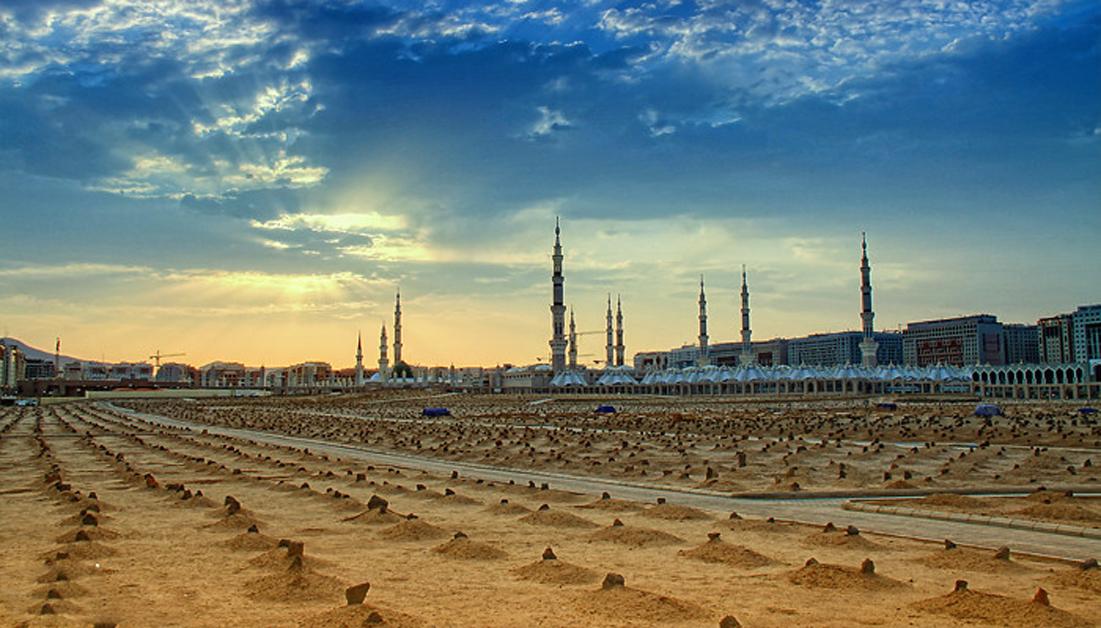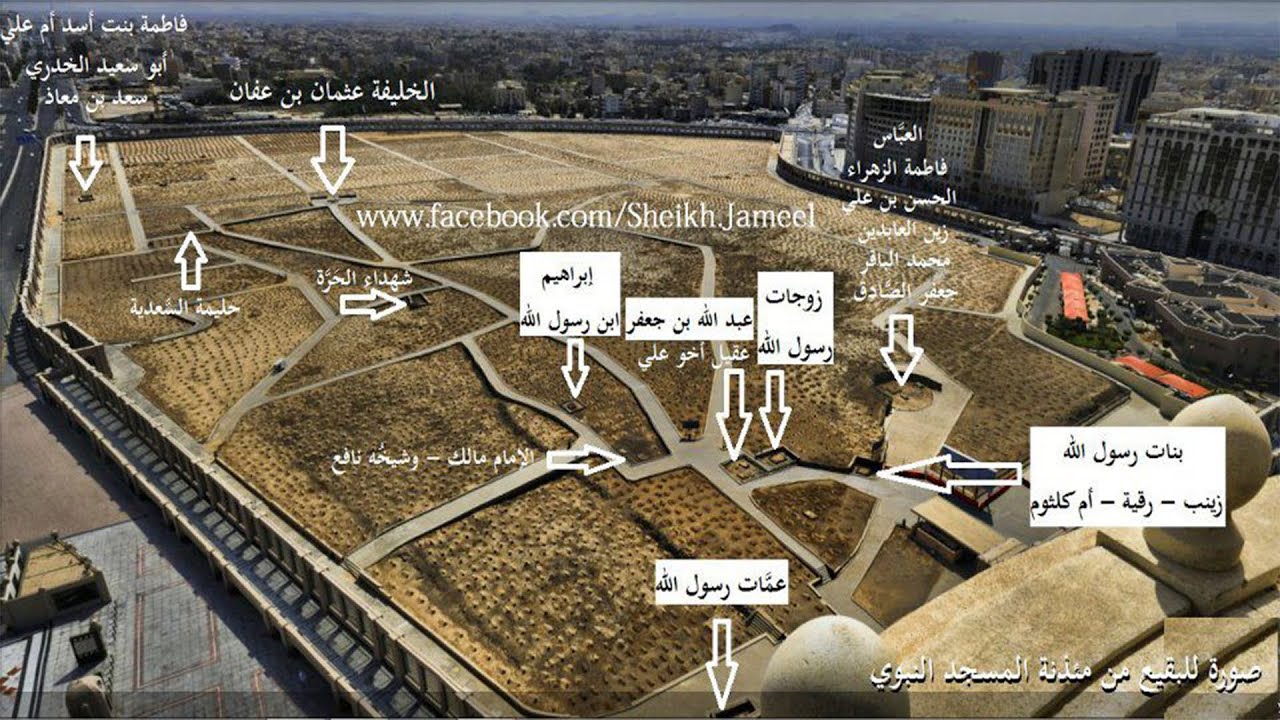Al-Baqi’ cemetery in Madina Almonwarh had what no other cemetery had. God Almighty wanted the Baqi’ cemetery to be for the people of Medina, and he commanded his Prophet, may God’s prayers and peace be upon him, to pray and seek forgiveness for his family, for he, may God’s prayers and peace be upon him, used to go out at night; To supplicate and ask forgiveness for the people of Al-Baqi’, and greet them, and attend the scenes of the deceased Companions - may God be pleased with them. In addition to that is his intercession, and his testimony, may God’s prayers and peace be upon him, for those who die in Medina. Al-Baqi’ cemetery, which dates back to 1400 years to the Prophetic era, is the most famous cemetery in the world because it is located near the Prophet’s Mosque in Madinah, which is visited annually by millions of Muslims to pray and then visit the tombs of the rest of the Gharqad to meet with his fellow holy prophets who They were buried in it. To follow the readers more about the most important tourist attractions in Madina Almonwarh, click here
Content
History of Al-Baqi Cemeteries, Madina Almonwarh
Al-Baqi' in the modern Saudi era
The merit of burial in Al-Baqi`, Madina Almonwarh
Al-Baqi' Cemetery, Medina

Al-Baqi’ cemetery in Madinah had what no other cemetery had. God Almighty wanted the Baqi’ cemetery to be for the people of Medina, and he commanded his Prophet, may God’s prayers and peace be upon him, to pray and seek forgiveness for his family, for he, may God’s prayers and peace be upon him, used to go out at night; To supplicate and ask forgiveness for the people of Al-Baqi’, and greet them, and attend the scenes of the deceased Companions - may God be pleased with them. In addition to that is his intercession, and his testimony, may God’s prayers and peace be upon him, for those who die in Medina. Thousands of honorable Companions, Ahl al-Bayt, Tabi’een and their followers, righteous people, and scholars have been buried in this Baqi’ to this day. It has also been reported that thousands of the people of al-Baqi' will enter Paradise, their faces like the moon on a full moon night, and they will enter Paradise without being brought to account. It was the main tomb of the people of Medina since the time of the Prophet Muhammad, and today it is one of the earliest historical sites for the construction of the Prophet's Mosque. It faced the southeast part of its wall and closed off nearby properties and built a new high wall with marble around it. The cemetery is still in use today. Refers to the rumble attributed to the rumbling tree. They differ from Zubair Baqi, Horus Baqi, Khajba Baqi, and Khadamat Baqi. Its current area is one hundred and eighty thousand square meters; The rest of the Gharqad includes the remains of thousands of people in the city and those who died nearby, and visitors or their bodies were transported in the past with a focus on honorable companions, and it is reported that ten thousand companions were buried in it, including Othman bin Affan, the third great caliphs and the mothers of the believers are Wives of the Prophet Muhammad, with the exception of Khadija and Maymoona. His daughter Fatima al-Zahra, son of Ibrahim, aunt Abbas, aunt Safiya, his wife Aisha bint Abu Bakr al-Siddiq and his grandson Hassan bin Ali, Ali bin Hussein, Muhammad al-Baqir and Yafer al-Sadiq
History of Al-Baqi Cemetery
When the Prophet Muhammad arrived in Medina from Mekkah elmukaramah in September 622, al-Baqi' was a land covered with sunken trees. Asaad bin Zarara, one of the companions of the Prophet Muhammad, died during the construction of the Prophet’s Mosque, which was bought by two orphans upon their arrival after their migration from Mecca to Medina. The Prophet Muhammad immediately chose the site as a cemetery, and buried the happiest person in al-Baqi under the rule of the Ansar. While the Prophet Muhammad was outside Medina during the conquest of Badr, his daughter Ruqayya fell ill and died in 624. Shortly after the arrival of the Prophet Muhammad from Badr, Uthman bin Mazoon died and was buried there. He was considered the first companion of the immigrant Prophet Muhammad, who was buried in the cemetery. Previously, Caliph Uthman bin Affan was buried near Al-Baqi' and bought it from Al-Ansari called Kawkab. The first ever remaining expansion was carried out by Muawiyah ibn Abi Sufyan, the first Umayyad caliphate, in honor of Uthman ibn Affan. Muawiyah was admitted to the Baqi cemetery.
Al-Baqi' in the modern Saudi era
The Saudi government faced many customs that it believed to be groups that returned to the Arabian Peninsula, such as blessing the graves of righteous fathers and sons, leading prayers, asking for help, hospitals, and others. On Shawwal 8, 1344 AH, the domes that were built over the tombs of some comrades in Baqy were destroyed. They destroyed these domes, based on their evolution from the hadiths, and the inadmissibility of blessing in graves, on the necessity of directing prayer to God despite the objections of some Muslims around the world.
History of Al-Baqi Cemetery
According to historical information, the Al-Baqi cemetery was founded by the Holy Prophet, may God bless him and grant him peace, when he migrated to Medina, and this happened immediately after the death of Saad bin Zarara, as the Prophet immediately chose the place of the remains to bury him. Then the companions were buried in the cemetery. Ruqayya, the Prophet's daughter, was one of the first to be buried there. Since then, the companions were buried there until I locked them up after the death of Caliph Othman bin Affan. This was his first expansion by the first Umayyad caliph, Muawiyah ibn Abi Sufyan. Al-Baqi cemetery acquired importance and holiness for the relics of the Prophet, peace and blessings of God be upon him. His visit and prayers to his people appeared, as a prophet said: “Gabriel came to me and I answered him. He said: "Your Lord commands you to come and forgive the remaining people." Since then, visiting the Al-Baqi cemetery has become an integral part of visiting Medina after visiting the Prophet’s Mosque, which included the room of Lady Aisha, where the Prophet and his companions Abu Bakr and Omar were buried, and then Abdul Malik bin Marwan joined the Prophet’s Mosque during the era of the Umayyad Caliph, according to historians, he was buried about 10, 000 comrades in the rest. In recent centuries, the expansion of the Baqi cemetery has continued by those who govern the two holy mosques, and it is expected to witness further expansion, the largest in its history within the current expansion of the Prophet's Mosque on the eastern side. After its expansion, it will double the current area and reach about 300,000 square meters (equivalent to about 42 football fields), and the total number of graves will reach about 42,000. Al-Baqi cemetery is considered the tomb of famous people of the Islamic world. In addition to the famous Companions and the prestigious house of the Prophet buried there, there were also celebrities from the 20th century such as Sultan Abdul Majeed II, the last Ottoman Sultan, King Muhammad Idris Al-Senussi of Libya and the late Al-Azhar Sheikh Muhammad Sayyid Tantawi. In addition to the Egyptian Islamic thinker, Muhammad al-Ghazali. The municipality of Madinah supervises the Al-Baqi cemetery, where it provides all services due to pressure on the cemetery, especially during the Hajj and Umrah seasons, including the preparation of the largest money laundering in the world, the General Presidency of the Deputy of Virtue and the Prevention Authority provided in a cemetery to provide guidance and advice. For visitors, in addition to placing many guides in the cemetery and following funerals
To follow up and read more about the most important tourist attractions in Medina, follow us:
What do you know about Mount Uhud, Medina?
Prophet's Mosque
Places worth visiting in Medina
The merit of burial in Al-Baqi`, Medina
Among the virtues of the Al-Baqi cemetery is that the Prophet, may God bless him and grant him peace, intercede for those who died in Medina. In the hadith of Abdullah bin Omar - may God be pleased with them both - in which it says: “Whoever is able to die in Medina, let him die there, for I will intercede for whoever dies there.” Narrated by Ahmad, Al-Tirmidhi, Ibn Hibban and his Sahih, Ibn Majah, and others. In the hadith of Sabi’a al-Aslamiyah - may God be pleased with her - that the Prophet, may God’s prayers and peace be upon him, said: “...No one dies in it unless I am his intercessor or a witness on the Day of Resurrection.” It was narrated by al-Tabarani in al-Kabir, and al-Bayhaqi in al-Sha`b, and it is good. In the hadith of the orphan woman - may God be pleased with her - that the Prophet, may God’s prayers and peace be upon him, said: “...for whoever dies in Medina, I will be a witness for him or an intercessor on the Day of Resurrection.” Narrated by al-Tabarani with authentic men. The Prophet, may God’s prayers and peace be upon him, frequently visited the people of al-Baqi’, saluting them and asking forgiveness for them. On the authority of Mrs. Aisha - may God be pleased with her - she said: The Messenger of God, may God bless him and grant him peace, would go out at the end of the night to al-Baqi’ every night. We are deferred, and God willing, we will catch up with you. Oh God, forgive the people of Baqi’ al-Gharqad. Narrated by Muslim (Book of Funerals).
And the saying of Mrs. Aisha - may God be pleased with her -: “Whenever her night comes out… he comes out…” is evidence of the repetition and continuity of that. Because this word is a general term, it requires renewal and continuity.
On the authority of Abdullah bin Abbas - may God be pleased with them both - he said: The Messenger of God, may God’s prayers and peace be upon him, passed by the graves of the people of Medina, and turned his face to them and said: (Peace be upon you, O people of the graves, and may God forgive us and you, you are our ancestors, and we are in the trail) Narrated by (Tirmidhi and Hassan) Funeral Book).
On the authority of Abu Hurairah - may God be pleased with him- that the Messenger of God, may God’s prayers and peace be upon him, went out to the cemetery, and said: (Peace be upon you, the home of a believing people, and we will, God willing, follow you. I wish I had seen our brothers...) The hadith, narrated by Imam Malik, And Imam Ahmad in his Musnad, and Sahih Imam Muslim (The Book of Purification). On the authority of Abdullah bin Abi Malikah - may God have mercy on him - that Mrs. Aisha - may God be pleased with her - came one day from the tombs, and I said to her: O Mother of the Believers, where did you come from? She said: From the grave of my brother Abd al-Rahman bin Abi Bakr - may God be pleased with them both - and I said to her: Wasn't the Messenger of God, may God bless him and grant him peace, forbid visiting graves? She said: Yes, he forbade, then ordered her to be visited. Narrated by al-Hakim, and authenticated by al-Dhahabi. It was narrated by Ibn Majah in his Sunan, and Al-Bazzar briefly
To follow the readers more about the most important tourist attractions in Medina, click here
Inquire about city hotel offers through the reservations team on WhatsApp on the following numbers
+9660549447929
+9660557729553
+9660580899895
We are glad to see you follow us

